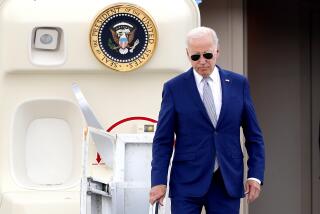Indian Leader Visits China on Mission of Reconciliation
- Share via
BEIJING — Indian Prime Minister Atal Behari Vajpayee extended to China an olive branch of “peace, friendship, trust and cooperation” Monday as he began a six-day visit here aimed at improving strained relations between the world’s two most populous countries.
After a welcoming ceremony on Tiananmen Square that featured a 19-cannon salute and a parade of Chinese soldiers, Vajpayee held an hourlong conversation with Chinese Premier Wen Jiabao and signed a declaration agreeing to set aside historical differences and work together to promote economic growth and the interests of the developing world.
In the declaration, the Indian government for the first time explicitly recognized the Tibet Autonomous Region as part of China’s territory, the official New China News Agency reported today. Tibet has been a long-standing bone of contention in the bilateral relationship because India is home to a large Tibetan community, including the Dalai Lama’s government in exile.
The trip marked the first time in nearly a decade that an Indian prime minister had set foot in China. Vajpayee’s carefully choreographed visit was designed to highlight the recent warming in relations between the longtime adversaries, which account for one-third of the world’s population. The prime minister’s visit marked the third time that top Chinese and Indian officials have met in the past month.
During a private talk Monday at the Great Hall of the People, Wen assured the Indian leader China would not meddle in South Asian affairs and would be a “constructive player” in promoting peace in the region, according to the New China News Agency. Those comments appeared aimed at dispelling fears about China’s close relationship with Pakistan, India’s longtime adversary. As a reminder of the tensions in that arena, India test-fired a short-range surface-to-air missile Monday, the fifth such test in the past month.
Afterward, the two leaders held a brief public exchange in which Wen predicted that their “friendly private talks” will “yield a major impact on the future development of our relationship.” Vajpayee responded by noting that “India attaches great importance to having cooperative relations with China.” The agreements signed by the two governments included commitments to ease visa restrictions and expand cooperation in education, energy conservation and scientific research.
Later in the afternoon, the Indian prime minister spoke at Peking University, where he told students that a marriage between China’s manufacturing base and India’s technology could provide prosperity for citizens of both countries, according to media reports.
Absent from Vajpayee’s public agenda were any references to the long-standing border dispute between India and China, which sparked a war in 1962. Though the military hostilities have ceased, the governments have not been able to agree on a formal demarcation of their border, which extends more than 2,175 miles.
Indian officials have said Vajpayee will raise the territorial conflict during his tour of China, which includes meetings today with Chinese President Hu Jintao and his predecessor, Jiang Zemin. Chinese analysts don’t expect a resolution of the dispute during this week’s visit. But they believe Vajpayee’s improved relations with China’s top leaders could lead to greater trust and eventually closer cooperation, not only on the border problem but on regional issues such as the nuclear standoff in North Korea.
Chu Shulong, director of the Institute of Strategic Studies at Beijing’s Tsinghua University, said India’s leaders must first be persuaded that China will not use its relationship with Pakistan to undermine stability among its neighbors.
“If there was a war [between India and Pakistan], it would be disaster for them and for China,” he said. “It is in their common interest to ease tensions in South Asia.”
From Beijing, Vajpayee is scheduled to make a brief stop in the imperial capital of Luogang before moving on to Shanghai, China’s leading commercial center. There he is expected to focus on the small but rapidly developing economic relationship between the two countries. Trade between India and China has increased dramatically in recent years, growing from about $247 million in 1991 to nearly $5 billion last year. In the first four months of this year, bilateral trade jumped 71% over the same period the previous year, according to the New China News Agency.
So far, China has held the advantage, with its companies accounting for most of the trade between the two countries.
More to Read
Sign up for Essential California
The most important California stories and recommendations in your inbox every morning.
You may occasionally receive promotional content from the Los Angeles Times.













